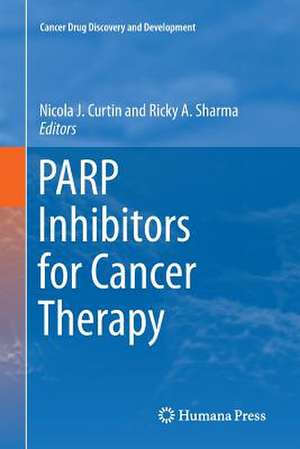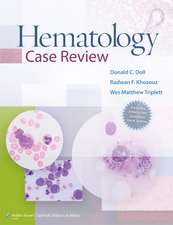PARP Inhibitors for Cancer Therapy: Cancer Drug Discovery and Development
Editat de Nicola J. Curtin, Ricky A. Sharmaen Limba Engleză Paperback – 21 feb 2018
PARP inhibitors are a group of pharmacological inhibitors that are a particularly good target for cancer therapy. PARP plays a pivotal role in DNA repair and may contribute to the therapeutic resistance to DNA damaging agents used to treat cancer. Researchers have learned a tremendous amount about the biology of PARP and how tumour-specific defects in DNA repair can be exploited by PARPi. The “synthetic lethality” of PARPi is an exciting concept for cancer therapy and has led to a heightened activity in this area.
| Toate formatele și edițiile | Preț | Express |
|---|---|---|
| Paperback (1) | 1111.46 lei 6-8 săpt. | |
| Springer International Publishing – 21 feb 2018 | 1111.46 lei 6-8 săpt. | |
| Hardback (1) | 1118.73 lei 6-8 săpt. | |
| Springer International Publishing – 25 iun 2015 | 1118.73 lei 6-8 săpt. |
Din seria Cancer Drug Discovery and Development
- 5%
 Preț: 1474.98 lei
Preț: 1474.98 lei - 5%
 Preț: 1108.35 lei
Preț: 1108.35 lei - 5%
 Preț: 1415.75 lei
Preț: 1415.75 lei - 5%
 Preț: 1370.22 lei
Preț: 1370.22 lei - 5%
 Preț: 1452.28 lei
Preț: 1452.28 lei - 5%
 Preț: 1316.76 lei
Preț: 1316.76 lei - 5%
 Preț: 1439.50 lei
Preț: 1439.50 lei - 5%
 Preț: 1113.63 lei
Preț: 1113.63 lei - 5%
 Preț: 1126.24 lei
Preț: 1126.24 lei - 24%
 Preț: 1037.62 lei
Preț: 1037.62 lei - 5%
 Preț: 1466.37 lei
Preț: 1466.37 lei - 5%
 Preț: 1350.83 lei
Preț: 1350.83 lei - 5%
 Preț: 1417.54 lei
Preț: 1417.54 lei - 5%
 Preț: 1113.46 lei
Preț: 1113.46 lei - 5%
 Preț: 1428.54 lei
Preț: 1428.54 lei - 5%
 Preț: 1429.80 lei
Preț: 1429.80 lei - 5%
 Preț: 782.10 lei
Preț: 782.10 lei - 5%
 Preț: 1438.58 lei
Preț: 1438.58 lei - 5%
 Preț: 1110.32 lei
Preț: 1110.32 lei - 5%
 Preț: 1434.39 lei
Preț: 1434.39 lei - 5%
 Preț: 1365.85 lei
Preț: 1365.85 lei - 5%
 Preț: 1461.08 lei
Preț: 1461.08 lei - 5%
 Preț: 1106.86 lei
Preț: 1106.86 lei - 5%
 Preț: 982.20 lei
Preț: 982.20 lei - 5%
 Preț: 727.80 lei
Preț: 727.80 lei - 5%
 Preț: 1331.78 lei
Preț: 1331.78 lei - 5%
 Preț: 1297.43 lei
Preț: 1297.43 lei - 5%
 Preț: 1124.59 lei
Preț: 1124.59 lei - 5%
 Preț: 1433.10 lei
Preț: 1433.10 lei - 5%
 Preț: 1110.90 lei
Preț: 1110.90 lei - 5%
 Preț: 1317.79 lei
Preț: 1317.79 lei - 5%
 Preț: 1464.91 lei
Preț: 1464.91 lei - 5%
 Preț: 1939.63 lei
Preț: 1939.63 lei - 5%
 Preț: 1418.48 lei
Preț: 1418.48 lei - 5%
 Preț: 1438.94 lei
Preț: 1438.94 lei - 5%
 Preț: 1100.30 lei
Preț: 1100.30 lei - 5%
 Preț: 1109.96 lei
Preț: 1109.96 lei - 5%
 Preț: 990.60 lei
Preț: 990.60 lei - 5%
 Preț: 1443.13 lei
Preț: 1443.13 lei - 5%
 Preț: 1428.91 lei
Preț: 1428.91 lei - 5%
 Preț: 787.58 lei
Preț: 787.58 lei - 5%
 Preț: 1311.75 lei
Preț: 1311.75 lei - 5%
 Preț: 1331.78 lei
Preț: 1331.78 lei - 5%
 Preț: 1113.11 lei
Preț: 1113.11 lei - 5%
 Preț: 1440.76 lei
Preț: 1440.76 lei
Preț: 1111.46 lei
Preț vechi: 1169.95 lei
-5% Nou
Puncte Express: 1667
Preț estimativ în valută:
212.74€ • 231.17$ • 178.82£
212.74€ • 231.17$ • 178.82£
Carte tipărită la comandă
Livrare economică 21 aprilie-05 mai
Preluare comenzi: 021 569.72.76
Specificații
ISBN-13: 9783319344898
ISBN-10: 3319344897
Pagini: 612
Ilustrații: XIX, 591 p. 108 illus., 85 illus. in color.
Dimensiuni: 155 x 235 x 31 mm
Greutate: 0.84 kg
Ediția:Softcover reprint of the original 1st ed. 2015
Editura: Springer International Publishing
Colecția Humana
Seria Cancer Drug Discovery and Development
Locul publicării:Cham, Switzerland
ISBN-10: 3319344897
Pagini: 612
Ilustrații: XIX, 591 p. 108 illus., 85 illus. in color.
Dimensiuni: 155 x 235 x 31 mm
Greutate: 0.84 kg
Ediția:Softcover reprint of the original 1st ed. 2015
Editura: Springer International Publishing
Colecția Humana
Seria Cancer Drug Discovery and Development
Locul publicării:Cham, Switzerland
Cuprins
History of the discovery of poly (ADP-ribose).- Discovery of the PARP superfamily and focus on the lesser exhibited but not lesser talented members.- The role of PARPs in DNA Strand Break Repair.- TIPs: Tankyrase Interacting Proteins.- PARP and Carcinogenesis.- Multitasking roles for poly(ADP-ribosyl)ation in aging and longevity.- Overview of PARP Inhibitor Design and Optimization.- Structure Based Design of PARP Inhibitors.- Preclinical chemosensitization by PARP inhibitors.- Classification of PARP inhibitors based on PARP trapping and catalytic inhibition, and rationale for combinations with topoisomerase I inhibitors and alkylating agents.- Radiosensitisation by poly(ADP-ribose) polymerase inhibition.- The vasoactivity of PARP inhibitors.- Synthetic lethality with Homologous Recombination Repair defects.- Targeting tumour hypoxia with PARP Inhibitors: Contextual synthetic lethality.- Other determinants of sensitivity.- Synthetic sickness with molecularly targeted agents against the EGFR pathway.- Disruption of DNA repair by cell cycle and transcriptional CDK inhibition.- Resistance to PARP Inhibitors Mediated by Secondary BRCA1/2 Mutations.- PARP inhibitor resistance - what is beyond BRCA1 or BRCA2 restoration.- Introduction to PARPi clinical trials and future directions.- Clinical trials investigating PARP inhibitors as single agents.- Clinical trials of PARP inhibitors with chemotherapy.- Combination of PARP inhibitors with clinical radiotherapy.- Biomarkers for PARP Inhibitors.
Notă biografică
Nicola Jane Curtin, Ph.D. is Professor of Experimental Cancer Therapeutics at Newcastle University. Dr. Curtin is also the team leader for DNA damage signalling and repair projects within CR-UK Drug Development Programme.
Ricky Sharma is Associate Professor at the University of Oxford and Honorary Consultant in Clinical Oncology at the Oxford University Hospitals NHS Trust. He graduated in medicine from the University of Cambridge, and subsequently trained in toxicology, general internal medicine, medical oncology and clinical oncology in Cambridge, Glasgow, Leicester and London. Since 2006, he has led a translational research group at the University of Oxford focussed on DNA damage repair and the development of new chemotherapy and radiotherapy treatments for cancer.
Ricky Sharma is Associate Professor at the University of Oxford and Honorary Consultant in Clinical Oncology at the Oxford University Hospitals NHS Trust. He graduated in medicine from the University of Cambridge, and subsequently trained in toxicology, general internal medicine, medical oncology and clinical oncology in Cambridge, Glasgow, Leicester and London. Since 2006, he has led a translational research group at the University of Oxford focussed on DNA damage repair and the development of new chemotherapy and radiotherapy treatments for cancer.
Textul de pe ultima copertă
PARP Inhibitors for Cancer Therapy provides a comprehensive overview of the role of PARP—poly ADP ribose polymerase—in cancer therapy. The volume covers the history of the discovery of PARP and its role in DNA repair. Additionally, it describes the discovery of the PARP family, and includes a discussion of other DNA maintenance-associated PARPs. As well, the volume features a section on the accessible chemistry behind the development of inhibitors.
PARP inhibitors—PARPi—are a group of pharmacological inhibitors that are particularly good targets for cancer therapy. PARP plays a pivotal role in DNA repair and may contribute to the therapeutic resistance to DNA-damaging agents used to treat cancer. Researchers have learned a great deal about the biology of PARP and how tumor-specific defects in DNA repair can be exploited by PARPi. The “synthetic lethality” of PARPi is an exciting concept for cancer therapy, and has led to heightened activity in this area.
PARP inhibitors—PARPi—are a group of pharmacological inhibitors that are particularly good targets for cancer therapy. PARP plays a pivotal role in DNA repair and may contribute to the therapeutic resistance to DNA-damaging agents used to treat cancer. Researchers have learned a great deal about the biology of PARP and how tumor-specific defects in DNA repair can be exploited by PARPi. The “synthetic lethality” of PARPi is an exciting concept for cancer therapy, and has led to heightened activity in this area.
Caracteristici
Includes the most up-to-date research on PARP inhibitors and their effects on cancer therapy Gives a comprehensive review of the history of PARP, including the discovery of the PARP family Includes a section on accessible drug chemistry behind the development of inhibitors? Includes supplementary material: sn.pub/extras














